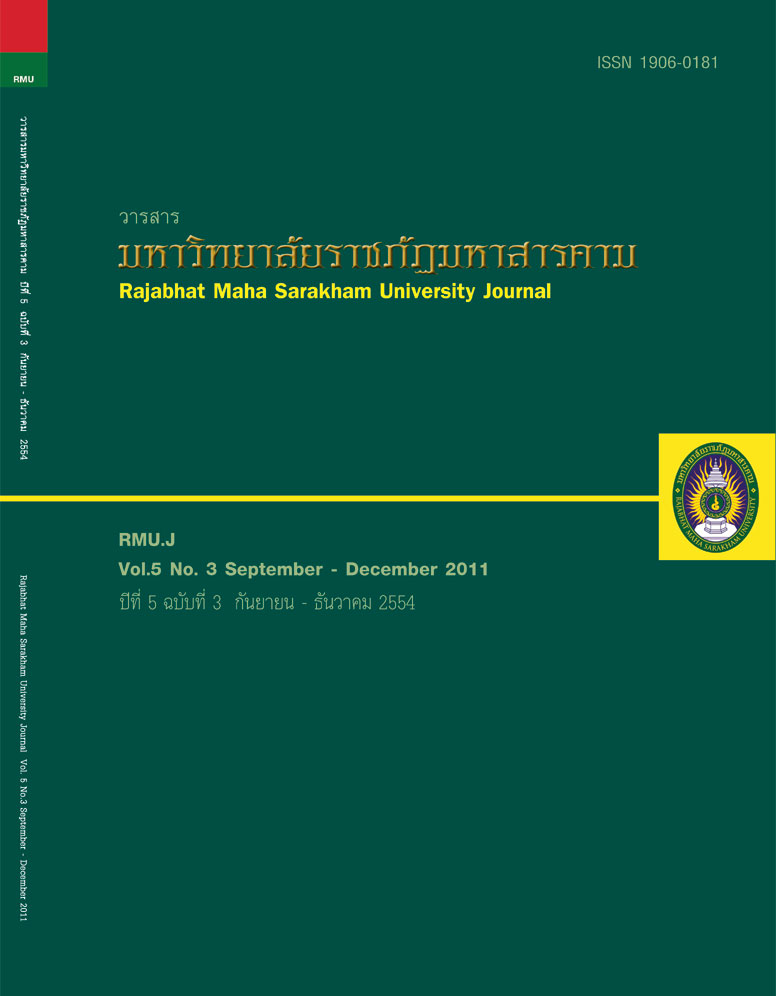การพัฒนาหลักสูตรฝึกอบรมผู้ปกครองในการจัดกิจกรรมเสริมสร้างประสบการณ์การเรียนรู้ ของเด็กปฐมวัย; Development Parents Training Curriculum to Organize Activities Promoted Early Childhood Learning Experience
Main Article Content
บทคัดย่อ
การวิจัยครั้งนี้มีวัตถุประสงค์เพื่อพัฒนาหลักสูตรฝึกอบรมผู้ปกครองในการจัดกิจกรรมเสริมสร้างประสบการณ์การเรียนรู้ของเด็ก
ปฐมวัยที่มีประสิทธิภาพตามเกณฑ์ 80/80 กลุ่มตัวอย่าง ได้แก่ ผู้ปกครองเด็กปฐมวัยอายุระหว่าง 3-5 ปีในเขตจังหวัดมหาสารคามที่
มีวุฒิการศึกษาไม่ตํ่ากว่า ระดับ อนุปริญญาจำนวน 40 คนใช้วิธีการการวิจัยและพัฒนา (Research and development) เครื่องมือ
ที่ใช้ในการวิจัย คือ หลักสูตรการฝึกอบรมผู้ปกครองจัดกิจกรรม เสริมสร้าง ประสบการณ์การเรียนรู้เด็กปฐมวัยที่พัฒนาขึ้นจากการ
วิเคราะห์สภาพปัญหาและความต้องการจัดกิจกรรมเสริมสร้างประสบการณ์การเรียนรู้เด็กปฐมวัยมากำหนดหัวเรื่อง หัวข้อหลัก หัวข้อ
ย่อย เนื้อหา กิจกรรม สื่อและการประเมิน โดยผ่านการประชุมกลุ่มย่อย (Focus group) จากผู้เกี่ยวข้อง กับการใช้หลักสูตร จำนวน
10 คน นำข้อมูลที่ได้ไปยกร่างหลักสูตร ได้คู่มือวิทยากร คู่มือผู้ปกครองและเครื่องมือประเมินหลักสูตร 8 รายการนำเสนอที่ปรึกษา
และให้ ผู้เชี่ยวชาญ จำนวน 5 คน ตรวจสอบความสอดคล้อง ความเหมาะสมและถูกต้อง นำมาปรับปรุง แก้ไขแล้วนำหลักสูตรฝึก
อบรม ไปทำการวิจัยเชิงทดลอง (Experimental research) แบบ One group pretest posttest design ซึ่งใช้การประเมินแบบ
CIPP Model ของ แดเนียล แอล สตัฟเฟิลบีม (Daniel L. Stufflebeam) ผลการวิจัยพบว่า
1. การศึกษาด้านสภาวะแวดล้อม (Context evaluation : C) พบว่า สภาพปัญหาและความต้องการจัดกิจกรรมเสริมสร้าง
ประสบการณ์การเรียนรู้เด็กปฐมวัยของผู้ปกครองเด็กปฐมวัยจำนวน 354 คนผู้ปกครองมีปัญหาเกี่ยวกับความรู้ความเข้าใจและการ
ปฏิบัติกิจกรรมการเรียนรู้ และด้านความต้องการการฝึกอบรมการจัดกิจกรรมการเรียนรู้เด็กปฐมวัยอยู่ในระดับมากเรียงตามลำดับค่า
เฉลี่ยดังนี้คือ กิจกรรมนิทาน กิจกรรมเพลง/ดนตรี/การเคลื่อนไหวตามจังหวะ กิจกรรมศิลปะ กิจกรรมการเล่นของเล่น กิจกรรมการ
ละเล่น/การเล่นกลางแจ้ง กิจกรรมการเรียนรู้จากแหล่งเรียนรู้ กิจกรรม การใช้แบบฝึกทักษะและกิจกรรมเกมคอมพิวเตอร์มีค่าเฉลี่ย
ระหว่าง 4.26 - 3.55
2. การศึกษาปัจจัยเบื้องต้นหรือปัจจัยป้อน (Input evaluation : I) จากการนำหลักสูตรฝึกอบรมผู้ปกครองในการจัดกิจกรรม
เสริมสร้างประสบการณ์การเรียนรู้เด็กปฐมวัย ที่พัฒนาขึ้น เพื่อขอคำแนะนำจากปรึกษา และให้ผู้เชี่ยวชาญ จำนวน 5 คนประเมินความ
สอดคล้อง (IOC) 8 รายการ ผลปรากฏว่า เอกสารประกอบหลักสูตร (สำหรับวิทยากรและสำหรับผู้ปกครอง) มีความเหมาะสม และ
แบบประเมินหลักสูตรเพื่อหาความสอดคล้องทั้ง 8 รายการพบว่า มีความ สอดคล้อง ในระดับสูงทุกรายการ ซึ่งแสดงให้เห็นว่าหลักสูตร
ฝึกอบรมนี้ สามารถนำไปใช้ ฝึกอบรมได้ เมื่อนำหลักสูตรที่พัฒนาขึ้นไป ทดลองใช้ (Try - out) กับผู้ปกครองเด็กปฐมวัยที่มีอายุระหว่าง 3-5 ปี จำนวน 24 คน โดยแบ่งกลุ่มการจัดกิจกรรมเสริมสร้าง
ประสบการณ์ การเรียนรู้ออกเป็น 8 กลุ่ม กลุ่มละ 3 คนพบว่า ผลรวม ทั้ง 8 กิจกรรมมีค่า E1/E2 เท่ากับ 90.00 / 83.54 ส่วนคะแนน
จากการฝึกปฏิบัติงาน มีคุณภาพ ระดับดี มีค่าเฉลี่ย 89.58 สรุปว่าหลักสูตรมีประสิทธิภาพสูงกว่าเกณฑ์ที่กำหนดผู้ปกครองที่เข้าร่วม
การฝึกอบรม มีความพึงพอใจเป็นส่วนใหญ่อยู่ในระดับดี และดีมากตามลำดับมีค่าเฉลี่ยระหว่าง 4.44 - 3.87 และ 4.65-4.54
3. การศึกษาด้านกระบวนการ (Process evaluation : P) โดยการนำหลักสูตรที่ผ่านการทดลอง (Try-Out) มาปรับปรุงและ
แก้ไขแล้วนำไปทดลองใช้เพื่อเก็บรวบรวมข้อมูล (Implement) กับกลุ่มตัวอย่างคือผู้ปกครองเด็กปฐมวัยที่มีอายุระหว่าง 3-5 ปี จำนวน
40 คน ผลรวมทั้ง 8 กิจกรรมมีค่า E1/E2 มีค่าเฉลี่ย 90.50/86.88 ส่วนคะแนนจากการฝึกปฏิบัติงานมีคุณภาพระดับดีมีค่าเฉลี่ย 89.02
สรุปว่าหลักสูตรมีประสิทธิภาพสูงกว่าเกณฑ์ที่กำหนด ส่วนผลการนิเทศด้านการฝึกอบรมของวิทยากรอยู่ในระดับดีมากมีค่าเฉลี่ยระหว่าง
5.00-4.66 และการประเมินความคิดเห็นของการฝึกอบรมพบว่าผู้ปกครองที่เข้าร่วมการฝึกอบรมมีความพึงพอใจเป็นส่วนใหญ่อยู่ใน
ระดับดี และดีมากตามลำดับมีค่าเฉลี่ยจาก 4.45 ถึง 3.90 และ 4.72 ถึง 4.52
4. การศึกษาด้านผลผลิต (Product evaluation : P) ผู้ปกครองที่ผ่านการเข้าฝึกอบรมนำความรู้ทั้งด้านทฤษฎีและด้านปฏิบัติไป
จัดกิจกรรมเสริมสร้างประสบการณ์การเรียนรู้ให้กับลูกที่บ้านผลปรากฏดังนี้ 1) ผู้ปกครองสามารถจัดกิจกรรมเสริมสร้างประสบการณ์
การเรียนรู้เด็กปฐมวัย อยู่ในระดับดีทุกหัวข้อมีค่าเฉลี่ยระหว่าง 4.45 - 4.05 แสดงว่าพ่อแม่/ผู้ปกครองสามารถจัดกิจกรรมฯ ได้ในระดับดี
2) พฤติกรรมการเรียนรู้ของเด็กปฐมวัยจากการจัดกิจกรรมเสริมประสบการณ์การเรียนรู้ 3 ครั้งพบว่าพฤติกรรมสูงขึ้นทุกกิจกรรม
3) ความสนใจทำกิจกรรมของลูกที่มีระดับมาก ได้แก่ กิจกรรมนิทาน เพลง/ดนตรี/เคลื่อนไหวฯการเล่นของเล่น และกิจกรรมเกม
คอมพิวเตอร์ กิจกรรมที่ทำให้เด็กสนุกมาก ได้แก่ กิจกรรมเพลง/ดนตรี/เคลื่อนไหวฯ และการเล่นของเล่น ส่วนกิจกรรมที่เด็กให้ความ
ร่วมมือทำกิจกรรมได้ดีมาก ได้แก่ กิจกรรมนิทาน การเล่นของเล่น การละเล่น/กิจกรรมกลางแจ้ง และการเรียนรู้แหล่งเรียนรู้ ด้านข้อ
เสนอแนะของผู้ปกครองคือต้องการที่จะให้มีการอบรมในกิจกรรมต่างๆ อีก เพราะจะทำให้พ่อแม่/ผู้ปกครองมีความมั่นใจในการจัด
กิจกรรมเสริมสร้างการเรียนรู้ได้อย่างหลากหลาย;
This research aimed to develop parents training curriculum to organize activities promoted early childhood
learning experience had efficiency of established criteria 80/80. Forty parents who graduated at least
associate degree were selected as research samples. Research and Development technique was used for
this research. The research tool was parents training curriculum to organize activities promoted learning
experience for early childhood developed from problem and need analysis in order to organize activities
and used the information to assign a topic, a main title, a subtitle, contents, activities, media and assessment
through the focus group. Those were 10 people who were relevant to curriculum users to provide information
for drafting the curriculum. These can get key person training handbook, guardian training handbook and 8
items of curriculum assessment tool. The instruments can be presented the draft to advisors for inspection,
and then presented to five experts to investigate the congruence, appropriation and accuracy for curriculum
revision and development. Experimental research is used one group pre-test post-test design as a research
methodology and Daniel L. Stufflebeam of “CIP Model” was also used to evaluate the results of this experiment.
The research results were as follows:
1. Context Evaluation: C
Three hundred and fifty four parents who were encountered problems related to gaining knowledge,
understanding and learning operation and the need of organizing activities are at a high level ranking from
high to low: a fairy tale, a song/music, a rhythmic movement, an art, toy playing, outdoor playing, learning
from resource centre, skill practice, and computer game activities. The means of these items were between
4.26 -3.55.
2. Input Evaluation: I
Eight items of curriculum’s handbook for key persons and parents were assessed by five experts
using Index of Congruence (IOC). The result of IOC indicated that all handbooks were highly congruent
in every item. It was shown that the curriculum can be used for training. The results of trying out all eight
curriculums with twenty-four parents (each curriculum per three parents) divided into 8 activities. The total
of E1/E2 values of eight activities was 90.00/83.54 whereas a quality of work practices was 89.58 referred to
a good level. Conclusion was indicated that an effectiveness of the curriculum was higher than established
criteria. The satisfaction of parents who participated in training was rated at a high and the highest level. The
means were between 4.44-3.87 and 4.65 -4.54.
3. Process Evaluation: P
After finishing from trying out, the curriculums were developed to implementation. The research
was conducted forty parents of early childhood who were 3-5 years of age. The result of eight activities as
E1/E2 of each activity was 90.50/86.88. The mean scores of quality of work practices was 89.02 referred to a
good level. Conclusion was indicated that the effectiveness of the curriculum was higher than established
criteria. In addition, the result of supervision on training of key persons was rated at the highest level. The
means were between 5.00-4.66. And the satisfaction of parents who participated in training was also rated
at a high and the highest level. The means were between 4.45- 3.90 and 4.72-4.52.
4. Product Evaluation: P
According to the follow-up of the samples that passed through the training courses both theory
and practice to organize learning experiences activities at home, the results indicated that 1) all parents were
able to organize the activities at a high level in every item as averages of 4.05 and 4.45, 2) after three times
of activities participation, learning behavior of the children trend to be higher in every activity, 3) the children
paid more attention as a high level: a fairy tale, song/music/rhythmic movement, toy playing and computer
game activities. And activities that made children most fun were song/music/rhythmic movement and toy
playing activities. The children are able to perform their most cooperation: fairytale, toy playing, outdoor
playing, and learning resource centre activities. The parents recommended that they still need other training
courses because training made them more confidence in organizing of activities in order to promote variety
of learning.
Article Details
1. บทความที่ลงตีพิมพ์ทุกเรื่องได้รับการตรวจทางวิชาการโดยผู้ประเมินอิสระ ผู้ทรงคุณวุฒิ (Peer Review) สาขาที่เกี่ยวข้อง อย่างน้อย 3 ท่าน ในรูปแบบ Double blind review
2. ข้อคิดเห็นใด ๆ ของบทความที่ลงตีพิมพ์ในวารสารมหาวิทยาลัยราชภัฏมหาสารคาม นี้เป็นของผู้เขียน คณะผู้จัดทำวารสารไม่จำเป็นต้องเห็นด้วย
3. กองบรรณาธิการวารสารมหาวิทยาลัยราชภัฏมหาสารคาม ไม่สงวนสิทธิ์การคัดลอกแต่ให้อ้างอิงแสดงที่มา


